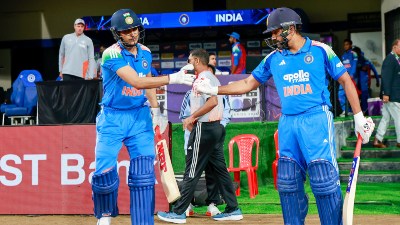Good cop, good cop
The security forces 8212; in Mumbai, Delhi and JK 8212; deserve to be complimented for their recent successes in neutralising key terrori...

The security forces 8212; in Mumbai, Delhi and J038;K 8212; deserve to be complimented for their recent successes in neutralising key terrorists, cracking open some of the networks and arresting important players of the terrorist war.
The killing of Ghazi Baba, who had acquired a somewhat legendary reputation, is a case in point. And so also is the arrest on Monday of key people by the Mumbai police suspected of playing an important role within a few days of the bomb blasts.
These successes hold out their own lessons, or at least pointers to lessons. The consequent pressure on even the normally confident Lashkar-e-Toiba and the Jaish-e-Mohammad is evident from some recent intercepts. The foremost, of course, is that the state and central police forces are capable of tackling terrorism on their own. It could also mean that terrorism would escalate as a consequence.
The effectiveness of such operations obviously relies heavily on timely and accurate intelligence from the grassroots level upwards. This also includes the more widespread use of modern technology like signals intelligence, which in the past had remained the preserve of the military forces and some elite intelligence organisations.
Given the nature of today8217;s globalised world and the rapid spread of communications, such capabilities would have to be expanded if we are to harness all the means at our command to tackle the menace of terrorism. But we must also remember the importance of individual rights and liberties because this is, at one level, a battle against popular alienation as well. The role of the civil community continues to be crucial. Ordinary people hesitate to come forward with information for fear of reprisals by vicious terrorists; and strengthening their will to duty is an important part of the war against terror.
Another aspect is that even where we are able to apprehend suspects, the long time between arrest and conviction tends to diffuse the impact of such success. The stakes for the criminal thus are lowered considerably and provide fewer inhibitions for others to violate the law and liberty of innocents. Some of the more prominent cases of murder even in the Capital clearly indicate the problem.
The obvious key to civilised and peaceful society is justice that is sure and swift, and is seen to be so in order to ensure that the punishment for breaking the law actually acts as a deterrent to others. In the case of terrorists this is even more important since death in an encounter would allow them to be projected as martyrs. At the same time, we also need to ensure that our liberties do not become a casualty to an attempt to impose effective deterrents.
Finally, the success of actions taken by the police in three different locations in the country, indicates that a decentralised response to terrorism, sensitive to local intelligence, can sometimes have extremely gratifying results.
- 01
- 02
- 03
- 04
- 05






























